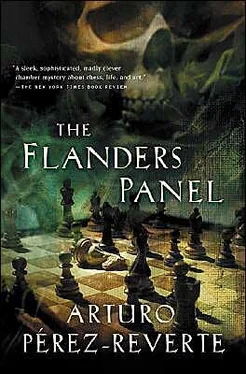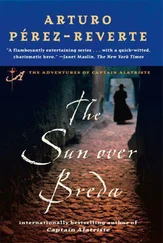“I don’t want any interviews.”
“That’s a shame, if you don’t mind my saying so. Your reputation is your livelihood. Publicity can only increase your professional standing.”
“Not that kind of publicity. After all, the painting was stolen from my apartment.”
“We’re trying to gloss over that fact. You’re not to blame, and the police report leaves no doubt about that. Everything points to your friend’s boyfriend having handed over the painting to an unknown accomplice. That’s their main line of enquiry. I’m sure it will turn up. It wouldn’t be easy to export a painting as famous as the Van Huys illegally. At least, not in theory.”
“I’m glad you’re so confident. That’s what I call being a good loser. Good sportsmanship, I think they call it. I’d have thought that the theft would have been a real blow to your company.”
Montegrifo put on a pained expression. Doubt is most hurtful, his eyes seemed to say.
“As indeed it is,” he replied, looking at Julia as if she’d done him an injustice. “In fact I had a lot of explaining to do at our head office in London. But such problems are always cropping up in this business. Still, it’s an ill wind… Our branch in New York has discovered another Van Huys: The Money Changer of Louvain.”
“The word ‘discovered’ strikes me as a bit excessive. It’s a well-known painting, it’s been catalogued. It belongs to a private collector.”
“You’re well-informed, I see. What I meant to say is that we’re in negotiations with the owner. He considers that now is the moment to get a good price for his painting. My colleagues in New York have managed to get in before our competitors.”
“Congratulations.”
“I thought we might celebrate.” He looked at the Rolex on his wrist. “It’s almost seven o’clock now, so how about coming out to supper with me? We need to discuss your future work with us. There’s a polychrome statue of San Miguel, seventeenth-century Indo-Portuguese, that I’d like you to have a look at.”
“That’s very kind of you, but I’m still rather upset. My friend’s death, the matter of the painting… I wouldn’t be very good company tonight.”
“As you wish.” Montegrifo took her refusal with resigned gallantry and without losing his smile. “If you like, I’ll phone you early next week. Would Monday be all right?”
“Fine.” Julia held out a hand and he clasped it gently. “Thanks for dropping in.”
“It’s always a pleasure to see you, Julia. If you need anything” – he gave her a long look, full of meanings she couldn’t quite decipher -“and I mean anything, whatever it might be, don’t hesitate to call me.”
He left, turning at the door to give her one last, brilliant smile. Julia spent another half hour on the Buoninsegna before putting away her things. Munoz and Cesar had insisted that she not go home for a few days, and Cesar had again offered her his house; but Julia had remained steadfast, simply changing the security lock. Stubborn and immovable, as Cesar had described her with some annoyance during one of his many phone calls to check that everything was all right. As for Munoz, Julia knew, because Cesar had let it slip, that both of them had spent the night after the murder keeping watch near her building, numb from the cold, with only a thermos of coffee and a flask of brandy (which Cesar had had the foresight to bring with him) for company. Swaddled in overcoats and scarves, they consolidated the odd friendship which, by force of circumstance, these two very different personalities had struck up around Julia. When she found out, she forbade them to repeat the episode, promising in exchange that she wouldn’t open the door to anyone and that she would go to sleep with the derringer underneath her pillow.
She saw the gun when she was putting her things in her bag and she brushed the cold chrome-plated metal with the tips of her fingers. It was the fourth day since Menchu’s death with no cards or phone calls. Perhaps, she said to herself without conviction, the nightmare has ended. She draped a linen cloth over the Buoninsegna, hung her overalls in a cupboard and put on her raincoat. The watch on the inside of her left wrist said it was quarter to eight. She was just going to put out the light when the phone rang.
She put the receiver down and stood holding her breath, suppressing the desire to run as far away as possible. A shiver, a breath of icy air down her spine, made her tremble violently, and she had to lean on the table to recover. She couldn’t take her eyes off the phone. The voice she’d just heard was unrecognisable, asexual, like the voice ventriloquists give to their creepy articulated dummies. A voice with shrill notes in it that had pricked her skin with a stab of blind terror.
“Room 12, Julia.” Silence and muffled breathing, perhaps because a handkerchief was covering the mouthpiece. “Room 12,” the voice had said again. “Brueghel the Elder,” it added after another silence. There was a short, dry, sinister laugh and the click of the phone being put down.
She tried to put her scattered thoughts in order and not let panic take over. Cesar had told her once that when ducks were flushed out by beaters for the benefit of hunters’ rifles, it was the frightened ones who were always the first to fall. Cesar. She picked up the phone and dialled his shop and then his home number, but got no answer. She had no success with Munoz either. She would have to fend for herself, and she trembled at the thought.
She took the derringer out of her bag and cocked it. At least that way, she thought, she could be as dangerous as the next person. Again the words Cesar had spoken to her as a child surfaced. There are exactly the same things in a room at night as there are in the daytime; it’s just that you can’t see them.
Pistol in hand, she went out into the corridor. At that hour the building was deserted apart from the security guards making their rounds, but she didn’t know where to find them. She had to go down three flights of stairs which formed a sharp angle with a broad landing on each floor. Lights cast a bluish penumbra there, in which could be made out dark paintings, the marble banister and busts of Roman patricians watching from their niches.
She took off her shoes and put them in her bag. The chill from the floor seeped through the soles of her feet and into her body. This night’s adventure might end up giving her a monumental head cold. She stopped now and then to peer over the banister, though without seeing or hearing anything suspicious. At the bottom she had to make a choice. One route, through several rooms set up as restoration workshops, would lead her to a security door through which, using her electronic card, she could get out to the street near Puerta Murillo. The other route, at the end of a narrow corridor, would take her to a door that led into the museum itself. It was usually closed but never locked before ten o’clock at night, when the guards made their final inspection of the annex.
She stood at the bottom of the stairs, the gun in her hand, considering the two possibilities. She could either get out as fast as possible or find out what was going on in Room 12. The second option would involve an unpleasant trek of six or seven minutes through the deserted building. Unless, on the way, she was lucky enough to meet the guard in charge of that wing, a young man who, whenever he found Julia working in the studio, would buy her coffee from the vending machine and joke about what nice legs she had, assuring her that they were the main attraction at the museum.
What the hell, she said to herself, after all, she had once killed pirates. If the murderer was there, it was a good opportunity, perhaps the only one, to meet him face to face. She, being a sensible duck, was watching out of the corner of her eye; meanwhile in her right hand she held eighteen ounces of chrome metal, mother-of-pearl and lead which, when fired at a short distance, could easily reverse the roles in this unusual hunting trip.
Читать дальше












